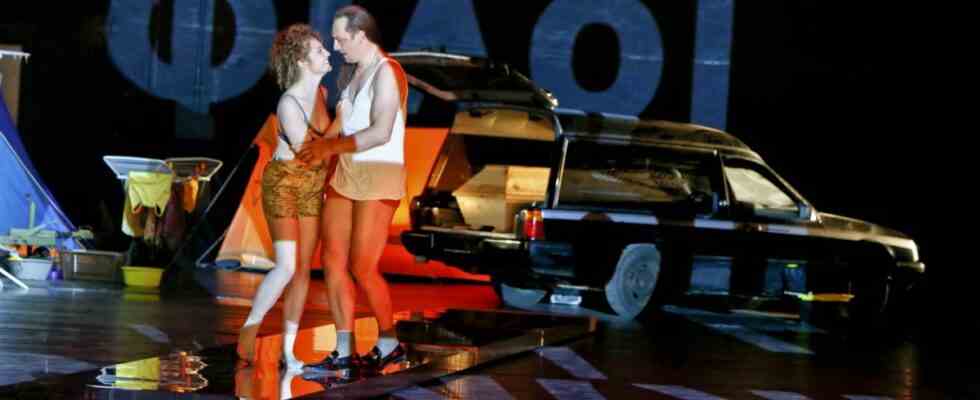The farewell to Hades is a dance: Anne Rietmeijers Alkestis lays a kind of freestyle Charleston to Vicky Leandros’ “I love life”, while her husband Admetos, who mourns preventively, waits for her to finally bury herself. “Your suitcase is already waiting in the hallway,” sings Leandros; At the back of the stage of the Bochumer Schauspielhaus, Grim Reaper is waiting with the coffin. Alkestis will soon climb into it. However, the masked grim reaper will not transport her away because his hearse apparently has an engine failure that is difficult to repair.
There is no doubt that Euripides’ “Alcestis” is a strange play: King Admetus, sentenced to death by Artemis for withholding offerings, receives permission from her brother Apollo to have someone else die for him. Only his wife Alkestis is willing to do this. The scene in which Admetos suffers (“Your word is pain. I beg you, don’t leave me!”) doesn’t seem to have any tragic depth, because you always think: Then go yourself instead of sending your wife ahead. Every director is aware of this dramatic breaking point when dealing with the material.
Hanging laundry as a skip action
The Bochum drama boss Johan Simons has already dealt with it, in 2016 in a production of Christoph Willibald Gluck’s opera “Aleceste”. Four female singers remain as the overhang of this arrangement, who, accompanied by an organ, form a baroque-antique theater chorus and comment on the piece. This almost marble framing makes the long-term camper aesthetics of the rest of the piece appear even more arbitrary: Admetos lives with Alcestis in a small trailer, hanging up the laundry as an overhand action plays – as in real life, if not necessarily in ancient drama – a central role.
It’s somehow understandable that Rietmeijer and Steven Scharf’s long-maned Admetos roll over each other properly (albeit clothed) before they go to the underworld – the impending death can also be an aphrodisiac. The nervous appearance of this king, who wavered between self-portrayal emotion and self-justifying irritation, who cowardly passed on his own certain death, is also quite understandable. But why hardly anyone hits him in the face for his selfishness, neither the proudly mourning nurse Elsie de Brauw nor the house guest Herakles, remains unexplained and inexplicable. Only his father Pheres, played by Stefan Hunstein as a plaid-dressed dude with a bouquet of sunflowers, says what everyone should think: his son is a failure.
Herakles – Pierre Bokma’s friend who tries to be friendly, lace-up shoes with a backpack and a little outback hat – finally turns the problem into a more classic one Deus ex machina loosen and bring back Alcestis from Hades, or on the stranded death service car. Nobody really knows how to deal with it, certainly not Admetos. What’s all this about? Why didn’t he just die himself? You would have saved yourself the theatre.
Perhaps one should have been present when this production was played in the amphitheater of Epidaurus. It premiered there in July as part of the Athens Epidaurus Festival. Perhaps the warm Argolic air and the aura of the millennia-old venue would have made the inconsistencies appear less significant, and the contrast might even have been appealing. In any case, in the 1950s atmosphere of the Bochumer Schauspielhaus, this season opening wasted away on an evening that didn’t want to be quite tragic and lacked the wit to be real comedy.

